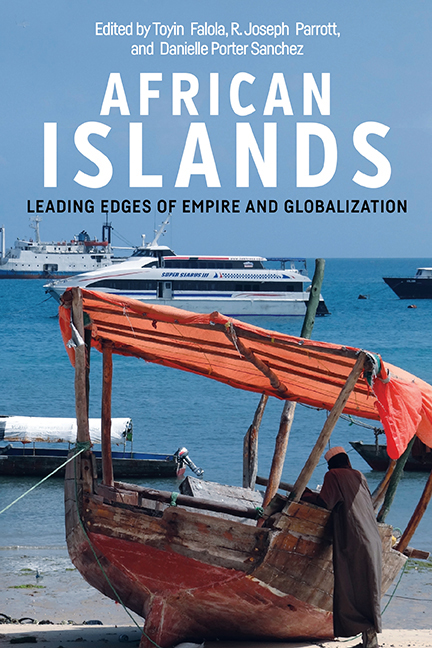Book contents
- Frontmatter
- Dedication
- Contents
- Introduction: Arbiters and Witnesses of Change: Contextualizing Conversations on African Islands
- Part 1 Atlantic Ocean Islands
- 1 The Canaries to Africa: The Atlantic Strategy of “To Be or Not to Be”
- 2 Sugar, Cocoa, and Oil: Economic Success and Failure in São Tomé and Príncipe from the Sixteenth to the Twenty-First Centuries
- 3 The Bijagos of Canhabac Island (Guinea-Bissau)
- 4 An Island in the Middle of Everywhere: Bioko under Colonial Domination
- 5 Cursing in Bioko and Annobón: Repeating Islands that Don't Repeat
- 6 African Ports and Islands during the Second World War
- 7 “Nos lingua, nos kultura, nos identidadi”: Postcolonial Language Planning and Promotion in Cabo Verde and the Cape Verdean Diaspora
- Part 2 Indian Ocean Islands
- Notes on Contributors
- Index
3 - The Bijagos of Canhabac Island (Guinea-Bissau)
from Part 1 - Atlantic Ocean Islands
Published online by Cambridge University Press: 31 August 2019
- Frontmatter
- Dedication
- Contents
- Introduction: Arbiters and Witnesses of Change: Contextualizing Conversations on African Islands
- Part 1 Atlantic Ocean Islands
- 1 The Canaries to Africa: The Atlantic Strategy of “To Be or Not to Be”
- 2 Sugar, Cocoa, and Oil: Economic Success and Failure in São Tomé and Príncipe from the Sixteenth to the Twenty-First Centuries
- 3 The Bijagos of Canhabac Island (Guinea-Bissau)
- 4 An Island in the Middle of Everywhere: Bioko under Colonial Domination
- 5 Cursing in Bioko and Annobón: Repeating Islands that Don't Repeat
- 6 African Ports and Islands during the Second World War
- 7 “Nos lingua, nos kultura, nos identidadi”: Postcolonial Language Planning and Promotion in Cabo Verde and the Cape Verdean Diaspora
- Part 2 Indian Ocean Islands
- Notes on Contributors
- Index
Summary
It is difficult to imagine a more defiantly quixotic and historically bellicose people than those who inhabit Canhabac Island in the Bijagos Archipelago, just off the southerly coast of Guinea-Bissau. Since the settlement of the archipelago in the thirteenth to the fourteenth centuries, the indigenous people of Canhabac, called Canhabacers or the Bijagos of Canhabac, have proven their skill not only as fishermen, builders of seafaring canoes, agriculturalists, barter merchants, artisanal craftsmen, and spiritualists, but also as coastal slave raiders, slave traders, international commercialists, and capable of a fierce and effective defense of their islands against a lengthy historical train of would-be invaders. The Portuguese waged repeated wars against Canhabacers, usually to be repeatedly turned back or worn down; French and British warships had several military encounters with Canhabac war canoes on the high seas, mostly ending badly for the Europeans. Enthusiastic to develop economic exchange relations with coastal peoples— and with European settlers—and happy to join a network of global trade relations throughout their storied history, Canhabac islanders also have made clear, over the centuries, their determination to retain political autonomy over their habitat.
In this study, these themes are pursued in order to make clear the unusual ways in which the Bijagos of Canhabac have asserted themselves in the past several centuries both defensively as well as in pursuing offensive military operations; actively engaging in global commercial relations while at the same time painstakingly recreating a self-sustaining economic ne oautarchy. Social relations were characterized by an enduring villagecentered authority system in which decision-making roles were remarkably gender balanced. More generally, I indicate that Canhabacers were geographically sufficiently isolated from mainland Guinea-Bissauan societies to have maintained a profoundly decentralized form of self-rule on the island, while being located sufficiently close to the mainland to have pursued massive slave raiding in prior centuries, initially becoming immersed in globally oriented mercantile relations via trade with independent colonial settler-farmers and then via “development” and partial monetarization in the postcolonial era.
- Type
- Chapter
- Information
- African IslandsLeading Edges of Empire and Globalization, pp. 96 - 124Publisher: Boydell & BrewerPrint publication year: 2019



